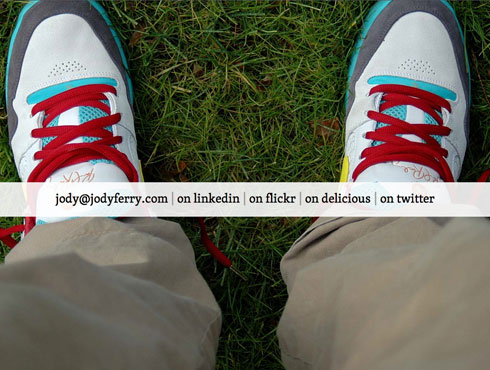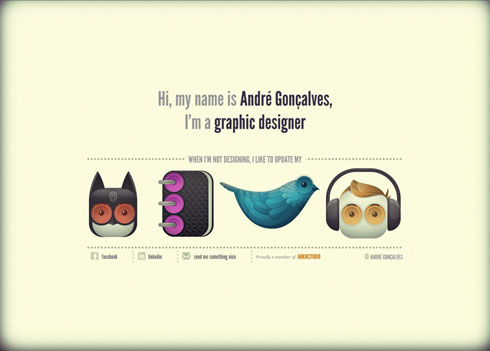 OUR PERSONAL SITES, once our primary points of online presence, are becoming sock drawers for displaced first-person content. We are witnessing the disappearance of the all-in-one, carefully designed personal site containing professional information, links, and brief bursts of frequently updated content to which others respond via comments. Did I say we are witnessing the traditional personal site’s disappearance? That is inaccurate. We are the ones making our own sites disappear.
OUR PERSONAL SITES, once our primary points of online presence, are becoming sock drawers for displaced first-person content. We are witnessing the disappearance of the all-in-one, carefully designed personal site containing professional information, links, and brief bursts of frequently updated content to which others respond via comments. Did I say we are witnessing the traditional personal site’s disappearance? That is inaccurate. We are the ones making our own sites disappear.

Obliterating our own readership and page views may not be a bad thing, but let’s be sure we are making conscious choices.
Interactive art director Jody Ferry’s site is a perfect example of the deeply decentralized personal page. I use the term “page” advisedly, as Jody’s site consists of a single page. It’s a fun, punchy page, bursting with personality, as intriguing for what it hides as what it reveals. Its clarity, simplicity, and liquidity demonstrate that Jody Ferry does indeed practice what the site’s title element claims: Interactive Art Direction and User Experience Design. All very good.
It could almost be the freshened-up splash page of a late 1990s personal site, except that the navigation, instead of pointing inward to a contact page, resume, blog, link list, and photos, points outward to external web services containing those same things. Mentally insert interactive diagram here: at left is a 1990s site whose splash page links to sub-pages. Structurally, its site map is indistinguishable from an org chart, with the CEO at the top, and everyone else below. At right, to re-use the org chart analogy, a site like Jody’s is akin to a single-owner company with only virtual (freelance) employees. There is nothing below the CEO. All arrows point outward.
Most personal sites are not yet as radically personal-content-outsourced as Jody’s, and certainly not every personal site will go this way. (Jody’s site might not even be this way tomorrow, and, lest it be misunderstood, I think Jody’s site is great.) But many personal sites are leaning this way. Many so inclined are currently in an interim state not unlike what’s going on here at zeldman.com:
- There are blog posts here, but I post Tweets far more frequently than I write posts. (For obvious reasons: when you’re stuck in an airport, it’s easier to send a 140-character post via mobile phone and Twitter than it is to write an essay from that same airport. Or really from anywhere. Writing is hard, like design.) To connect the dots, I insert my latest Tweet in my sidebar. I have more readers here than followers at Twitter, but that could change. Are they the same readers? Increasingly, to the best of my knowledge, there are people who follow me on Twitter but do not read zeldman.com (and vice-versa). This is good (I’m getting new readers) and arguably maybe not so good (my site, no longer the core of my brand, is becoming just another piece of it).
- Like nearly everyone, I outsource discoverable, commentable photography to Flickr.com instead of designing my own photo gallery like my gifted colleagues Douglas Bowman and Todd Dominey. Many bloggers now embed mini-bits of their Flickr feeds in their site’s sidebars. I may get around to that. (One reason I haven’t rushed to do it is that most of my Flickr photos are hidden behind a “friends and family” gateway, as I mainly take pictures of our kid.) Photography was never what this site was about, so for me, using Flickr is not the same as outsourcing the publication of some of my content.
- As I’ve recently mentioned, links, once a primary source of content (and page views) here, got offloaded to Ma.gnolia a while back. From 1995 until a few years ago, every time I found a good link, an angel got his wings and I got page views. My page views weren’t, brace yourself for an ugly word, monetized, so all I got out of them was a warm feeling—and that was enough. Now my site is, brace yourself again, monetized, but I send my readers to Ma.gnolia every time I find a link. Go figure.
I’m not trying to get rid of my readers, nor are you trying to shake off yours. In the short term, including Flickr, Twitter, and Ma.gnolia or De.licio.us feeds sends traffic both ways—out to those services, but also back to your site. (Remember when some of us were afraid RSS would cost us our readers? It did and it didn’t. With RSS, good writers gain readers while often losing traditional page views. But that’s another story.) I’ve certainly found new websites by going to the Twitter profile pages of people who write funny or poignant Tweets. Behind a great Flickr photo may be a great designer whose site you might not have found if not for first seeing that photo.

But outsourcing the publication of our own content has long-term implications that point to more traffic for the web services we rely on, and less traffic and fewer readers for ourselves.
This is not necessarily a bad thing. Not every person who designs websites needs to run a personal magazine on top of all their other responsibilities. If your goal in creating a personal site way back when was to establish an online presence, meet other people who create websites, have fun chatting with virtual friends, and maybe get a better job, well, you don’t need a deep personal site to achieve those goals any more.
But if world domination is your goal, think twice before offloading every scrap of you.
Translations
[tags]personal sites, blogs, blogging, de.licio.us, ma.gnolia, flickr, twitter, jodyferry, outsourcing, content, readers, readership[/tags]


